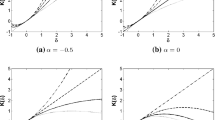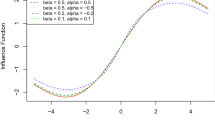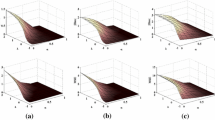Abstract
In this paper a new family of minimum divergence estimators based on the Brègman divergence is proposed, where the defining convex function has an exponential nature. These estimators avoid the necessity of using an intermediate kernel density and many of them also have strong robustness properties. It is further demonstrated that the proposed approach can be extended to construct a class of generalized estimating equations, where the pool of the resultant estimators encompass a large variety of minimum divergence estimators and range from highly robust to fully efficient based on the choice of the tuning parameters. All of the resultant estimators are M-estimators, where the defining functions make explicit use of the form of the parametric model. The properties of these estimators are discussed in detail; the theoretical results are substantiated by simulation and real data examples. It is observed that in many cases, certain robust estimators from the above generalized class provide better compromises between robustness and efficiency compared to the existing standards.





Similar content being viewed by others
References
Basu A, Harris IR, Hjort NL, Jones MC (1998) Robust and efficient estimation by minimising a density power divergence. Biometrika 85(3):549–559
Basu A, Shioya H, Park C (2011) Statistical inference: the minimum distance approach. CRC Press, Boca Raton
Beran R (1977) Minimum Hellinger distance estimates for parametric models. Ann Statist 5(3):445–463
Brègman L (1967) The relaxation method of finding the common point of convex sets and its application to the solution of problems in convex programming. Comp Math Math Phy 7(3):200–217
Carroll RJ, Ruppert D (1985) Transformations in regression: a robust analysis. Technometrics 27(1):1–12
Ghosh A, Basu A (2013) Robust estimation for independent non-homogeneous observations using density power divergence with applications to linear regression. Electron J Stat 7:2420–2456
Ghosh A, Basu A (2015) Robust estimation for non-homogeneous data and the selection of the optimal tuning parameter: the density power divergence approach. J Appl Stat 42:2056–2072
Hampel FR, Ronchetti EM, Rousseeuw PJ, Stahel WA (1986) Robust statistics: the approach based on influence functions. Wiley, New York
Huber PJ (1981) Robust statistics. Wiley, New York
Jones MC, Hjort NL, Harris IR, Basu A (2001) A comparison of related density-based minimum divergence estimators. Biometrika 88(3):865–873
Rousseeuw PJ, Leroy AM (1987) Robust regression and outlier detection. Wiley, New York
Scott DW (2001) Parametric statistical modeling by minimum integrated square error. Technometrics 43(3):274–285
Simpson DG (1987) Minimum hellinger distance estimation for the analysis of count data. J Am Stat Assoc 82(399):802–807
Simpson DG (1989) Hellinger deviance tests: efficiency, breakdown points, and examples. J Am Stat Assoc 84(405):107–113
Warwick J, Jones M (2005) Choosing a robustness tuning parameter. J Stat Comput Simul 75(7):581–588
Welch WJ (1987) Rerandomizing the median in matched-pairs designs. Biometrika 74(3):609–614
Acknowledgements
The authors gratefully acknowledge the comments of the associate editor and two anonymous referees which significantly improved the presentation of the paper.
Author information
Authors and Affiliations
Corresponding author
Electronic supplementary material
Below is the link to the electronic supplementary material.
Rights and permissions
About this article
Cite this article
Mukherjee, T., Mandal, A. & Basu, A. The B-exponential divergence and its generalizations with applications to parametric estimation. Stat Methods Appl 28, 241–257 (2019). https://doi.org/10.1007/s10260-018-00444-8
Accepted:
Published:
Issue Date:
DOI: https://doi.org/10.1007/s10260-018-00444-8




